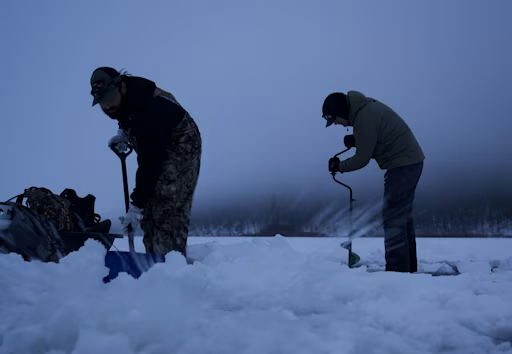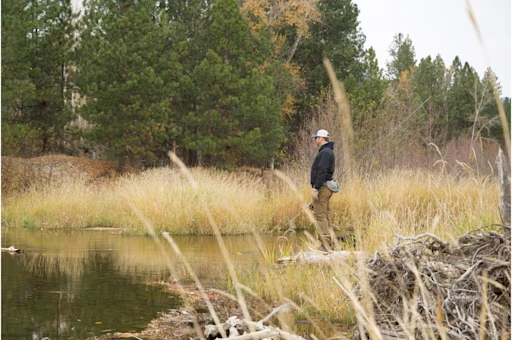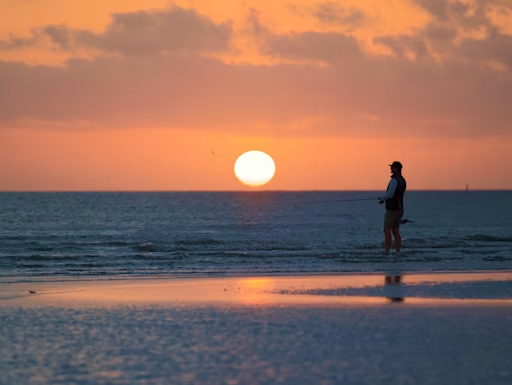Don't hang em up. The 10 fall fish we dream of casting for
Fall is a great time to be on the water. Cool weather, changing leaves and hungry fish make for the perfect time to fish. Take a look at some of our picks for the best species to target during this beautiful time of year.
Share this article

Leaves are transitioning to beautiful hues of gold, orange and red and morning temperatures leave a familiar chill in the air. Fall is almost here. The arrival of falling leaves and cool temperatures is also followed by disappearing crowds in some of our favorite fishing spots, leaving them all to ourselves.
Those who would abandon fishing in the fall are merely ignorant to how great the fishing can be. Fall is by far the preferred time of year to fish by many anglers in both salt and freshwater. For some species, this is by far the best time of year to catch a personal best.
Here are some of the species we at Fishbrain’s love to target, or dream of targeting, in the fall.
Arctic char

One of the least accessible and most coveted fish on this list, Arctic char live, you guessed it, near the Arctic circle. These members of the salmonid family are a mix between lake trout and salmon and are sought after in the fall for their incredible color changes. Like other anadromous fish, char come up into river systems to spawn. Like salmon, Arctic char undergo amazing physiological changes during their spawn, where male char transform their silver shine into brilliant shades of red and orange. Unlike their salmon relatives, however, Arctic char do not die after spawning.
Char are aggressive predators and will take a variance of lures, or flies. Spinners, dry flies, or streamers are all preferred tackle. The tricky issue with fall fishing for char is the same issue with finding them in the first place. These fish live so far north the deeper you get into fall, the more likely you are to find inclement and dangerous weather.
Lake trout

Lake trout are another member of the char family and usually associated with mind numbingly deep water (one fish was found deeper than 1,000 ft in the Great Lakes). Fall is one of two times per year when lakers actually come into the shallower water column, making them far more accessible to almost any angler. You can track these shallow migrations by watching the water temps. Temperatures in the upper 40s and low 50s seem to be the catalysts that send these fish into shallower water.
Shallow water itself is a relative term when fish can be found as deep as 1,000 feet, but you should be targeting 5-30 ft of water.
Controversy arises when targeting fall lakers, because this is their spawning season. It's important to consider the negative consequences of fishing for certain species during their spawning time. It's also important to note that lake trout are most commonly found as an invasive species, with a voracious appetite for native fish and are viewed as a problem in many waters.
Jack crevalle

The fall mullet run creates a feeding frenzy for multiple species, but one of the fiercest is the jack crevalle. These cousins of the giant trevalley can be found from the beach darting into dense schools of mullet. Mullet make up the majority of jack’s diet this time of year. Any fish you hook this time of year is going to take you for a ride, but pound for pound a jack may have you sweating sweating the most as it strips line from your reel.
If the mullet run came early, or will be late, this year Jacks are still a readily found species and can be targeted up against seawalls, in deep channels that but against mangroves and near docks.
Live bait, like shiners, greenbacks, or glass minnows is always preferred in the salt, but paddletails, spoons, large spinners and Rapala X-Raps will do the trick also.
Northern pike

Cooling temperatures have these voracious predators on the move and ready to attack your bait. In fall, Northern pike will follow baitfish into shallower water where the small baitfish spawn. Pike will inhabit weeds near these areas waiting to ambush the smaller baitfish and you can take advantage of this. Generally any sort of bright, flashing, lure will work well in inducing a strike.
Your personal best pike will still inhabit a little deeper water, but when the weather is first turning cool, you will have a much better chance at pulling one of these lunkers out from the deep.
As fall goes on, make sure to slow your retrieve down as the colder water will make for sluggish fish.
How Fishbrain helps you find northern pike
Finding pike in fall is finding where the bait have moved to. Fall is spawn time for tullibees, which make up a large part of a pike’s diet in the fall. Tullibees spawn in shallow water, similar to walleye, and if your timing is right, that is where you should be looking for hungry pike and if you’re really lucky a big muskie.
Use depth maps to focus in on where deeper water transitions into shallows. The satellite imagery on your map can help show possible weed beds, or other vegetation that will provide cover for both pike and baitfish, as well.
Striped bass

Fall is a great time to catch striper migrations in huge schools off the East Coast. To understand and time these migrations correctly, you must be armed with knowledge that stripers prefer temperatures between 55 and 68 degrees.
In the fall, when the weather and water cools off, you can find large school of stripers cruising down the coastline. The cool water temps, mean that the fish will actively chase baitfish into shallow waters and the surf, because of the prevalent oxygen that the cold water holds. This opens up the possibilities for beach and surf anglers immensely as stripers will usually thrive in the deeper, cooler, more oxygen-rich water far from the coast.
Out on the open water, if you can find schools of peanut bunker, silversides, or squid there will no doubt be a school of hungry stripers chasing them down soon.
How Fishbrain helps you find stripers

Filter catches on your map to the most recent. The recent catches will show you just how far along the migration is, letting you know where the fishing is hot, or where stripers haven't quite gotten yet.
Redfish

Redfish can be caught nearly year round from Virginia to Texas, but fall is your chance to catch a personal best. Like the northern pike mentioned above, redfish are searching to prey on baitfish that are spawning. However, redfish are fans of the warm water and will travel to find more of it. As the ambient water temps drop in the ocean, look for schools of big bull reds to travel more inland into estuaries, and brackish waters. The schools will have one thing on their mind, eating.
With such plentiful food in places like Louisiana, you don't always need to worry about matching the hatch with reds, but as the water cools down so can their preferences. Crabs, shrimp and mud minnows are always a good bet, however, as those species will also prefer to hole up in inland water for the winter months.
How Fishbrain helps you find redfish

Tracking bull reds, and other saltwater fish, is all about the tides, water temps, wind and other conditions. Turn on your forecast to track all these important weather features, including air pressure and sun and moon phases today, or for the rest of the week.
Trout

There are several different species of trout across the country and we couldn't pick just one. Browns, cutthroats, rainbows and brooktrout will all be hungry as the temps die down and fishing for all will arguably be at its peak in the fall. Trout are hungriest in the fall, as they begin a sort of feeding frenzy in preparations for winter where their metabolism will slow way down.
Trout are often not thought of in the same category of predator like pike, but almost everything is on the dinner table come fall. Bait anglers will find great success with crickets and nightcrawlers and lure anglers can utilize any sort of spinner lures to replicate a smaller trout, or sculpin minnow. For fly anglers, there will still be plenty of hatches happening for topwater action, but streamer fishing will be exceptional. Many fly anglers will utilize mouse patterns this time of year for exciting topwater takes from hungry rainbows and browns.
Walleye

Just like the pike they cohabitate with, walleye go on a feeding binge as the temperatures turn south. Walleye, like a lot of species, can be found at the edge of drop offs, near shallow weed beds in lakes. Also like the pike, they are targeting spawning baitfish to put on as many calories before you have to break out an auger to catch them.
Lakes aren’t the only habitat to find walleye, however. Fall is also a great time to target hyper aggressive river walleye as well. In rivers you can find walleye stacked up in deep pools, similar to the drop offs in lakes. The low water levels in fall make these deep pools more obvious and fish will begin piling up in them in preparation for summer.
How Fishbrain helps you find walleye
Sometimes all your luck and skill depends on what the fish are keyed in on. Water temps may affect how the fish are feeding, but you can easily check the gear used from other anglers on the app, to see which lures, or baits walleye are keying in on. You can also check the water temperature, with the River Gauges Layer, to see what the water temps are doing and selecting your lures based on that.
Largemouth bass

Fall bass tactics are very similar to pike and walleye. Look for big bucket mouths in weeds and structure, near drop offs. Big bass are also looking to feed, but the bait, or lure, that may be a game changer from pike and walleye is crawfish. Bass often target the crustaceans mercilessly and it is a prime opportunity for you to match that hatch.
Trophy largemouths will hold out the longest in deeper water. Bass prey species will have grown significantly by this time in the year and you can switch your baits to larger selections to match the larger sized baitfish. These larger lures will also be more enticing as they will offer a more substantial meal during a time where calories count the most.
How Fishbrain helps you find largemouth bass

As the weather and water temps turn, you need to start targeting the deep pocket, which will stay warmer. Use the Navionics depth maps to find these potholes and drop-offs and then get an accurate and easy to read number for how deep the water is. Focus the crosshairs on your map onto any area of the water to find the depth.
Muskie
The fish of 10,000 casts lives up to its name year-round, but fall may be the best time to knock a couple casts off that number.
One of the best times to target muskie are low light hours like dawn and dusk. As fall takes hold, hours of high sunlight lessen, giving more low light hours of prime fishing. Overcast days are also more common, hiding that direct sunlight that muskie tend to avoid. This is even more true in far north lakes in Canada.
How Fishbrain helps you find muskies

Use the app to keep track of your casts. When you start getting into the 9,000 numbers start paying attention as the fish of 10,000 casts really takes that much effort sometimes.
But for something more practical, look to your forecasts and time your days for lowlight conditions, either early morning, late evening, or overcast days will do.
Like bass and other freshwater species, a large lure may attract a strike during a time when calories gained versus calories lost is of utmost importance.
Disclosure: All these advantages are still just tactics, merely causing you to make 9,000 casts for the elusive predator, instead of ten. You will still need a healthy amount of luck and maybe a miracle to catch a muskie.
Fall is arguably the best time to be on the water regardless of fishing success. We hope you take the time to enjoy the falling leaves, cool mornings and the gentle solitude to enjoy the natural beauty of fall.
If you haven't experienced the #1 fishing app worldwide, make sure and check out Fishbrain to see all the fish data, fishing spots, weather conditions you've been missing out on plus much more.

Download the Fishbrain app and access the best fishing spots in your area
Related blog posts
Discover the best spots, techniques, and gear for successful fishing in urban areas and city waters on Fishbrain.

Master the hardwater season with advanced ice fishing tips . Learn how to find fish faster, refine your search and adjust presentations to catch more fish all winter long.

Your guide to Victoria’s best fish to catch in rivers, lakes, and coastal waters. Learn prime species, fishing tips, and key regulations




